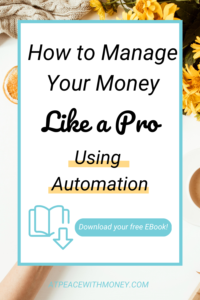How to Manage Your Money Like a Pro with Automation

Have you heard of decision fatigue? The idea is pretty simple. According to this article from the AMA, decision fatigue refers to “the idea that after making many decisions, your ability to make more and more decisions over the course of a day becomes worse.” Thanks to this phenomenon, it pays to reduce the number of decisions you need to make in a day. That’s where automation comes in.
Automation = Better Financial Habits
Automation is your money’s best friend. By automating your finances, you reduce your opportunities for decision making and decision fatigue, thereby reducing your chances to change your mind about saving money or paying a bill in full. By reducing your decisions you set yourself up for success! Automation can build up your savings and pay off your bills, without any extra effort on your part. So, how can you use automation as a financial tool?
Automate Your Bill Payments
There are many different facets of your finances which can benefit from automation. Automating your bills is a good place to start. Many banks have online bill pay options available that help you pay your regular monthly bills on time. In particular, automation is a good way to ensure you always pay your credit card balance in full, so that you don’t accrue any interest fees. However, one important thing to be aware of when automating your bills is that you will need to stay aware of your bank balance, to avoid over-drafting your account. As long as you keep an eye on your balance, automating your bills is a good way to avoid late fees, build good credit, and stay on top of your finances.
Automate Your Savings
The other major arena of your finances that definitely deserves some automation-attention is your savings. I touched briefly on automating your savings in an earlier article, which you can read here. The most important thing about automating your savings is that if money automatically gets moved out of your spending account, you have no chance to spend it. That makes saving that much easier! We do this with our retirement savings, and it really helps us keep it up. A great resource for further information about automating your savings is The Automatic Millionaire by David Bach.
If you liked this article and want more tips on financial organization that will make your life a LOT easier, you’ll probably enjoy a free copy of my eBook, 9 Secrets of Financial Self Care. Click here or below to download it!












 Now that I’ve made a case for separating your business and personal finances, let’s go over two different ways you can do this. In the beginning of this article, I mentioned that some solopreneurs think its sensible to avoid opening another account. It’s true that this can help you bypass banking fees associated with business accounts.
Now that I’ve made a case for separating your business and personal finances, let’s go over two different ways you can do this. In the beginning of this article, I mentioned that some solopreneurs think its sensible to avoid opening another account. It’s true that this can help you bypass banking fees associated with business accounts.



 Earlier in this article, I mentioned that a financial planner can be a good reference, but another option is to simply meet with a planner at a firm as needed. I had one client who, when planning for retirement, made one appointment at a firm and got all her questions answered. No commitment needed, and a good source of advice.
Earlier in this article, I mentioned that a financial planner can be a good reference, but another option is to simply meet with a planner at a firm as needed. I had one client who, when planning for retirement, made one appointment at a firm and got all her questions answered. No commitment needed, and a good source of advice.


 Making a regular habit of checking in with your finances. Make this easy by consolidating your passwords to your different accounts and portals. If you don’t have to go searching for passwords before you begin your checkin, you’re way more likely to actually do it!
Making a regular habit of checking in with your finances. Make this easy by consolidating your passwords to your different accounts and portals. If you don’t have to go searching for passwords before you begin your checkin, you’re way more likely to actually do it!


 While you’re nailing down the banking details of your new business, make sure you also create a money system for yourself. Have a plan to pay off your expenses and also pay yourself. My recommendation, of course, is Profit First, which
While you’re nailing down the banking details of your new business, make sure you also create a money system for yourself. Have a plan to pay off your expenses and also pay yourself. My recommendation, of course, is Profit First, which 


 Finally, I want to add a note about the need for diversification. Any professional will tell you that it’s important not to put all your eggs in one basket.
Finally, I want to add a note about the need for diversification. Any professional will tell you that it’s important not to put all your eggs in one basket. 


 having to take all that time and effort to take your paycheck to the bank. Even if you have your own business and have varying income, you can create a solopreneur paycheck using the Profit First system. If you’re interested in reading more about this, I recommend my posts
having to take all that time and effort to take your paycheck to the bank. Even if you have your own business and have varying income, you can create a solopreneur paycheck using the Profit First system. If you’re interested in reading more about this, I recommend my posts 


 Separating your accounts also makes things much easier at tax time, when you need that information anyway. Having your accounts separated and that information readily available means you’re less likely to give up and overpay on your taxes. This means more profit for you.
Separating your accounts also makes things much easier at tax time, when you need that information anyway. Having your accounts separated and that information readily available means you’re less likely to give up and overpay on your taxes. This means more profit for you.